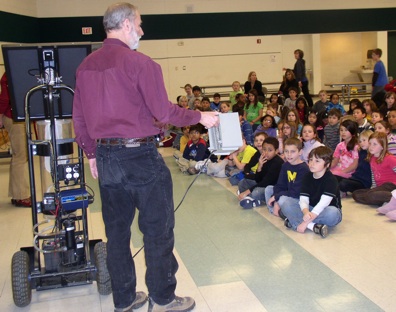From AAPSNews Service
Media Specialist Tahani Othman takes students around the world and home again as part of the humanities class she teaches to third-graders at Lawton Elementary School.

Their study of sustainability and world cultures this year included a recent visit from Itzik Henig, the founder and owner of SPII – Solar Power for Information and Independence. Henig’s contribution: A mobile, solar-powered device for areas around the world that do not have modern amenities such as running water and power.
He brought his invention to Lawton recently to demonstrate for students. His hope is to put the unit into production to help millions of people who have no access to potable water and electricity. The device produces sufficient low-load electricity for lighting, radio and cell phone charging.
“This device meets the basic needs for a single household,” explained Henig, an entrepreneur and automotive engineering technical specialist. “And, more importantly, it purifies water.”
Henig developed his prototype four years ago and has developed a second unit that he hopes to market across the world to people who are earning just $2 per day, on average. Eventually, he hopes to market the units on wheels for $120 each and help to create village-level economies.

“The need is pressing; it’s worldwide,” Henig told students. “Instead of making two to four dollars a day, they can make four to eight dollars – they could have a sewing operation or make a pump to bring water from the river.
“Things will be a little brighter – we can only imagine what could happen.”
Answering student questions, Henig said the battery should last about three years and will power many items, including charging cell phones and other basic things a typical household uses. It has only 12 components and each unit takes him about one week to make. It is on wheels, so “every morning you wheel it out and wait for the sun,” he said.
The lesson included showing students how a simple solar panel, battery and tank for water purification could work on a small scale to help so many and transform parts of the world.
“It was nice to make a real world connection for the students, said Othman. “The draw for me is it wasn’t a money-making idea. It’s helping people.”
Henig said this is a “life project” for him and that is working with the local Ann Arbor SPARK, Michigan State University and professors at the University of Michigan, the Michigan Economic Development Corporation and other professionals to get his idea launched. He hopes to have it in production soon as he continues to seek partners in the venture.
For more information, visit http://.spiiinc.com or email Henig at lhenig@yahoo.com.

